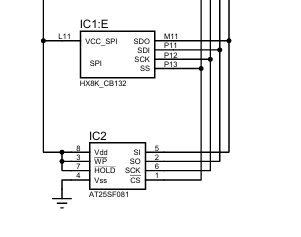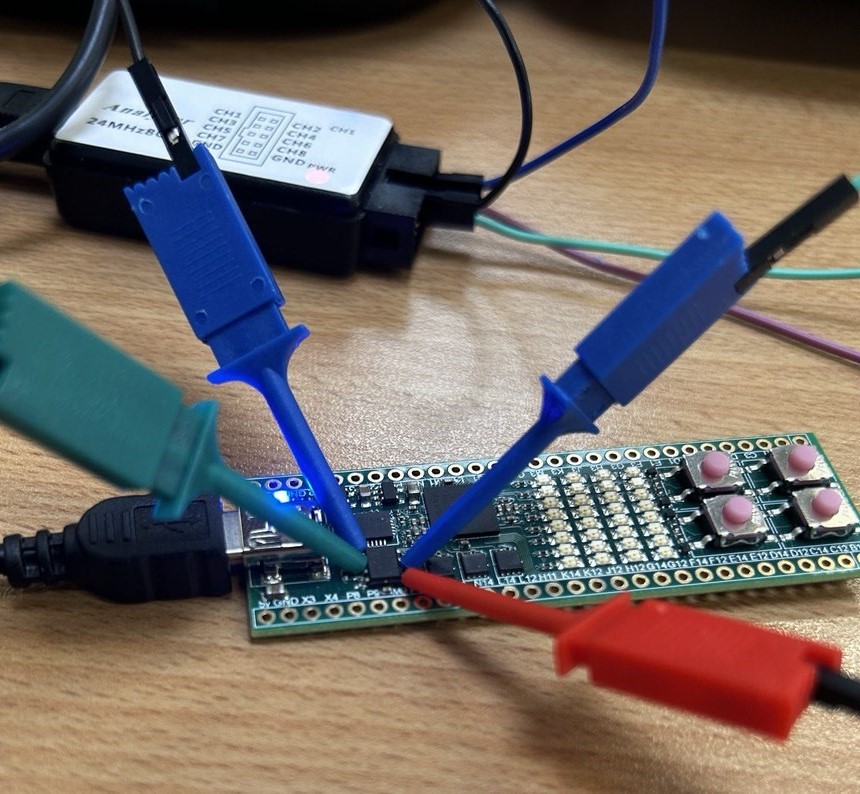I am again looking at the operation Figure 11-1 Read Manufacturer and Device ID Signal; however, do note that in the example below, I make no effort to read the MISO data anywhere on the FPGA - I am simply trying to observe if any data is returned via the physical MISO pin from the flash device.
For this, I put together a logic-analyzer setup in order to observe in real time the operation - this is how the 'lab' is set-up:
The output of the logic analyzer:
The logic analyzer is connected to the SPI Flash bus as followed:
- (CH1)
D0->SCK - (CH2)
D1->CS - (CH5)
D4->MOSI - (CH6)
D5->MISO
For reference, I also posted here about the timings of the SPI operation - the above logic-analyzer output suggests that the input timings are indeed conformant to this.
However, as can be seen there are no changes at all on MISO. This mirrors the finding of my previous attempt to get a response from MISO here.
The binary on the FPGA is as followed:
module top (
input clk, // Clock input
output cs, // Chip select signal for SPI
output sck, // Serial clock for SPI
input miso, // Master In Slave Out (data from SPI device)
output mosi // Master Out Slave In (data to SPI device)
);
// System clock counter and control for delay before starting SPI operation
reg [7:0] clock_counter; // 8-bit clock counter for timing
// SPI-related registers and flags
reg start_flash; // Flag to start SPI flash read operation
reg cs_register, mosi_register, sck_register; // Registers for SPI control signals
assign cs = cs_register; // Assign chip select signal
assign mosi = mosi_register; // Assign MOSI signal
assign sck = sck_register; // Assign SCK signal
// SPI operation counters and opcode
integer OPERATION_LENGTH; // Counter for the length of the SPI operation
integer SI_PULSE; // Counter for outgoing data bits (MOSI)
integer SO_SAMPLE; // Counter for incoming data bits (MISO)
reg [7:0] OPCODE; // 8-bit SPI opcode for the flash memory command
// Initial block to set default/reset states at simulation or reset
initial begin
// Initialize clock and LED states
clock_counter <= 0; // Reset clock counter
// Initialize SPI states
start_flash <= 0; // Don't start SPI flash read yet
// Set default states for SPI signals
sck_register <= 1; // Set SCK to high (idle)
cs_register <= 1; // Set chip select to high (inactive)
mosi_register <= 1; // Set MOSI to high
// Initialize SPI operation variables
OPERATION_LENGTH <= 0; // Initialize operation length counter
SI_PULSE <= 0; // Reset outgoing data bit counter
SO_SAMPLE <= 0; // Reset incoming data bit counter
OPCODE <= 8'b10011111; // Set SPI command (9Fh for "Read ID")
//OPCODE <= 8'h05; // Set SPI command (hex 0000 0101 for "Read Status Register Byte 1")
//OPCODE <= 8'h35; // Set SPI command (hex 0011 0101 for "Read Status Register Byte 2")
end
// Process to control the clock counter and start SPI operation
always @ (posedge clk) begin
if (clock_counter < 10) begin
clock_counter <= clock_counter + 1; // Increment clock counter
end else if (clock_counter == 10) begin
start_flash <= 1; // Start SPI flash read
end
if (OPERATION_LENGTH == 43) begin
start_flash <= 0; // Stop SPI operation after 43 cycles
clock_counter <= 0; // Reset clock counter
end
end
// SPI operation logic on negative clock edge
always @ (negedge clk) begin
if (start_flash == 1) begin
OPERATION_LENGTH <= OPERATION_LENGTH + 1; // Increment SPI operation length
if (OPERATION_LENGTH == 0) begin
cs_register <= 0; // Assert chip select (low)
SI_PULSE <= SI_PULSE + 1; // Increment outgoing bit counter
end
if (OPERATION_LENGTH > 0 && OPERATION_LENGTH < 8) begin
SI_PULSE <= SI_PULSE + 1; // Continue sending opcode bits
mosi_register <= OPCODE[7-SI_PULSE]; // Send opcode bit by bit (MSB first)
end
if (OPERATION_LENGTH >= 8 ) begin
SI_PULSE <= 0; // Reset SI_PULSE counter after sending opcode
end
if (OPERATION_LENGTH == 32) begin
cs_register <= 1; // Deassert chip select (high) after operation
end
// wait for some time before starting again the operation
if (OPERATION_LENGTH == 42) begin
OPERATION_LENGTH <= 0; // Reset operation length counter
end
end
end
// Clock assignment for the SPI clock (SCK) signal
always @(*) begin
sck_register = clk; // Set SCK to match the system clock
end
endmodule
As far as I can tell - I have not made an error implementing this operation. However, the lack of a response from the chip on MISO would suggest that I have made an error somewhere.
What should I do now?
This is the config file I am using to specify connection between the FPGA pins and the Verilog code:
set_io --warn-no-port clk P7
set_io --warn-no-port cs P13
set_io --warn-no-port sck P12
set_io --warn-no-port miso P11
set_io --warn-no-port mosi M11
From the iceFUN doc - this is how the flash is wired to the FPGA. Weirdly, it does look like the HOLD and WP pins are connected via a single FPGA output pin:



